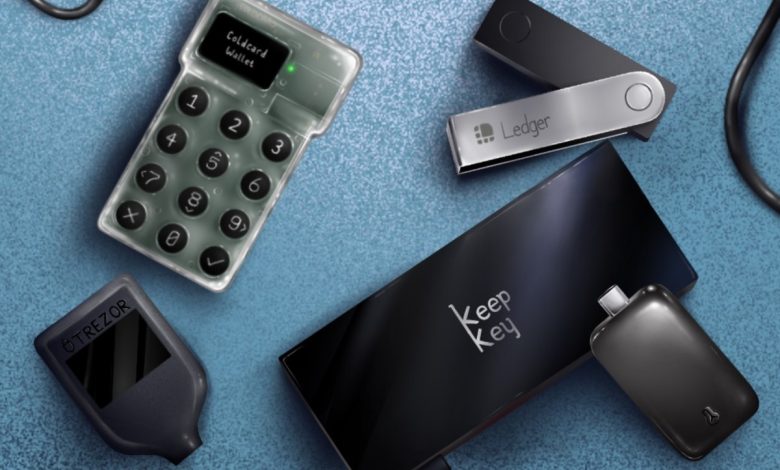The Best Crypto Hardware Wallets Reviewed

- What is a hardware wallet and why do you need one?
- Comparing the top crypto hardware wallets on the market
- Security features to look for in a hardware wallet
- Setting up and using a hardware wallet for your cryptocurrencies
- Pros and cons of using a hardware wallet for storing crypto
- Tips for choosing the best hardware wallet for your needs
What is a hardware wallet and why do you need one?
A **hardware wallet** is a physical device that securely stores the private keys necessary to access your cryptocurrency. Unlike software wallets, which are connected to the internet and therefore vulnerable to hacking, hardware wallets are offline and provide an extra layer of security.
Having a hardware wallet is essential for anyone who wants to keep their cryptocurrency safe from cyber threats. With the increasing number of hacking incidents and online scams targeting digital assets, it is crucial to store your private keys in a secure offline environment.
By using a hardware wallet, you can have peace of mind knowing that your cryptocurrency is protected from potential security breaches. Additionally, hardware wallets are user-friendly and offer convenient access to your funds whenever you need them.
Overall, investing in a hardware wallet is a smart decision for anyone who values the security and protection of their cryptocurrency assets. It is a small price to pay for the peace of mind that comes with knowing your digital wealth is safe and secure.
Comparing the top crypto hardware wallets on the market
When it comes to choosing a crypto hardware wallet, there are several top options on the market that stand out for their security features and user-friendly interfaces. Let’s compare some of the best crypto hardware wallets available to help you make an informed decision:
1. Ledger Nano S: The Ledger Nano S is a popular choice among cryptocurrency enthusiasts for its compact design and robust security features. With support for a wide range of cryptocurrencies and a built-in OLED display for easy transaction verification, the Ledger Nano S is a solid option for storing your digital assets securely.
2. Trezor Model T: The Trezor Model T is another top contender in the crypto hardware wallet space, known for its intuitive touchscreen interface and advanced security features. With support for over 1000 cryptocurrencies and a strong emphasis on user privacy, the Trezor Model T is a great choice for those looking for a high level of security and convenience.
3. KeepKey: KeepKey is a sleek and stylish hardware wallet that offers top-notch security features to keep your cryptocurrencies safe. With a large display and support for over 40 cryptocurrencies, KeepKey is a great option for those looking for a simple yet effective way to store their digital assets.
In conclusion, when comparing the top crypto hardware wallets on the market, it’s important to consider factors such as security features, ease of use, and supported cryptocurrencies. Whether you choose the Ledger Nano S, Trezor Model T, or KeepKey, you can rest assured that your digital assets will be safe and secure in one of these top-rated hardware wallets.
Security features to look for in a hardware wallet
When choosing a hardware wallet for your cryptocurrency, it is crucial to prioritize security features. Here are some key aspects to consider:
– **Secure Element**: Look for a hardware wallet that utilizes a secure element chip to store private keys securely. This ensures that your keys are protected from potential attacks.
– **PIN Code**: A strong PIN code is essential to prevent unauthorized access to your wallet. Make sure the hardware wallet you choose allows you to set a unique and complex PIN code.
– **Two-Factor Authentication**: Some hardware wallets offer two-factor authentication for an extra layer of security. This can include biometric authentication or a secondary verification step.
– **Offline Storage**: Hardware wallets are designed for offline storage of your cryptocurrency keys, making them less vulnerable to online threats such as hacking or phishing attacks.
– **Backup and Recovery**: Choose a hardware wallet that provides a secure backup and recovery process. This ensures that you can access your funds even if your wallet is lost or damaged.
By prioritizing these security features in your hardware wallet selection, you can better protect your cryptocurrency investments from potential threats. Remember to always research and compare different options to find the best fit for your needs.
Setting up and using a hardware wallet for your cryptocurrencies
To set up and use a hardware wallet for your cryptocurrencies, follow these simple steps:
- First, choose a reputable hardware wallet provider that offers secure storage for your digital assets.
- Next, purchase the hardware wallet from an authorized retailer to ensure authenticity.
- Once you have the hardware wallet in hand, carefully read the instructions provided by the manufacturer.
- Connect the hardware wallet to your computer using the USB cable included in the package.
- Follow the on-screen prompts to create a new wallet and set up a strong password to protect your funds.
- Generate a recovery seed phrase and write it down on a piece of paper to keep it safe from hackers.
- Transfer your cryptocurrencies from your exchange account to the hardware wallet address provided.
- Disconnect the hardware wallet from your computer and store it in a secure location, such as a safe or a lockbox.
- When you want to access your funds, simply reconnect the hardware wallet to your computer and enter your password.
- Make sure to keep your recovery seed phrase secure and never share it with anyone to prevent unauthorized access to your funds.
By following these steps, you can securely store and manage your cryptocurrencies using a hardware wallet for added peace of mind.
Pros and cons of using a hardware wallet for storing crypto
When it comes to storing your cryptocurrency, using a hardware wallet has its own set of advantages and disadvantages to consider.
- Pros:
- Enhanced security: Hardware wallets are considered one of the most secure options for storing crypto as they are offline and less susceptible to hacking.
- Protection against malware: Since hardware wallets are not connected to the internet, they are immune to malware attacks that could compromise your funds.
- Easy backup and recovery: Most hardware wallets come with a seed phrase that can be used to recover your funds in case the device is lost or damaged.
- Convenience: Hardware wallets are portable and can be easily carried around, allowing you to access your funds whenever needed.
- Cons:
- Cost: Hardware wallets can be more expensive than other storage options, which may not be ideal for those on a tight budget.
- Learning curve: Setting up and using a hardware wallet may require some technical knowledge, which could be challenging for beginners.
- Physical vulnerability: While hardware wallets are secure from online threats, they are still susceptible to physical damage or loss.
- Limited coin support: Not all hardware wallets support a wide range of cryptocurrencies, so you may need to research which ones are compatible with your holdings.
Tips for choosing the best hardware wallet for your needs
When looking for the best hardware wallet for your cryptocurrency needs, there are several factors to consider. First, **security** should be your top priority. Look for a wallet that offers **secure** storage of your private keys and has a strong reputation for **protecting** users’ funds. Additionally, consider the **compatibility** of the wallet with the cryptocurrencies you plan to store. Some wallets support a wide range of **digital assets**, while others are more limited in scope.
Another important factor to consider is **ease of use**. Choose a hardware wallet that has an intuitive interface and makes it simple to **transfer** funds in and out. **Customer support** is also crucial – make sure the wallet you choose has a **reliable** support team that can assist you in case of any issues. **Price** is another consideration, as some wallets may be more expensive than others but offer additional features or **security** measures.
Before making a decision, read **reviews** from other users to get a sense of their experiences with the wallet. **Research** the **reputation** of the company behind the wallet and make sure they have a track record of **security** and **reliability**. Finally, consider the **physical** design of the wallet – you’ll want something that is **durable** and **portable** for **convenient** use.
By taking these factors into account, you can choose the best hardware wallet for your **cryptocurrency** needs and **rest** assured that your **digital assets** are **securely** stored.




